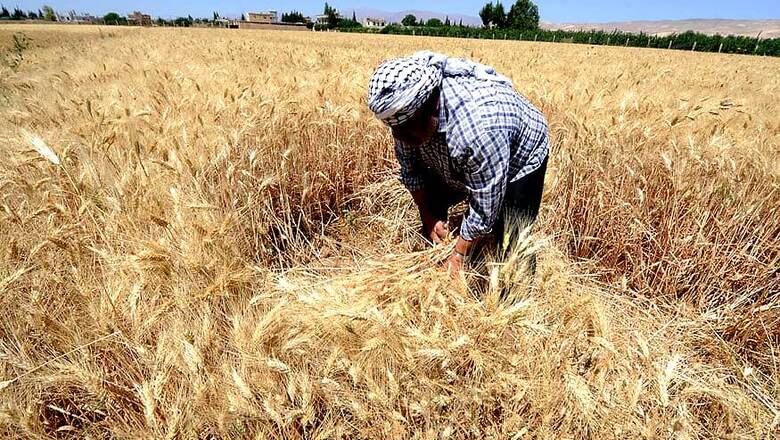
views
New Delhi: When Finance Minister Arun Jaitley presents Union Budget 2018-19 in Parliament on Thursday, RSS-inspired bodies will be looking out for three main things — an MRP-like pricing mechanism for farmers, tax relief for salaried class and steps to increase employability.
An MRP structure for crops has been among the major demands of the RSS-affiliated Bharatiya Kisan Sangh for some time now.
Speaking to News18, its national secretary Mohini Mohan Mishra said, “The government needs to cap the prices of vegetables and other farm produce. It is unfair that a farmer sells tomato at Rs 5 per kg, but the same it sold at mandis (markets) for Rs 30. The cost rises to Rs 50 per kg by the time it reaches the consumer. A farmer purchases all raw materials at maximum retail price, but sells the produce at minimum retail price.”
Mishra even dismissed minimum support price (MSP) as an “election gimmick”. “Farmers are not getting profitable price for their produce. Mandis are not taking the produce at the MSP. In fact, farmers end up getting less than the MSP at mandis…. The low MSPs are meant to appease those who purchase the produce. This is election politics. The mentality is not to pay the farmers, but to appease the consumer and the trader. If potato, onion or tomato prices increase, the government is defeated. So they oppose good price for farmers in the name of inflation.”
The farm section has also been the focus of another RSS-inspired group, the Bharatiya Vitta Salahkar Samiti or a body of chartered accounts. This group is of the view that the government must tax agricultural income of high-net-worth individuals (HNIs).
“There are 30 crore PAN card holders in India, but only 4 crore pay Income Tax. What’s the harm in taxing agriculture income of HNIs? To start with, the government can tax individuals with an income of over Rs 1 crore per annum. Those earning more than Rs 1 crore from agriculture should pay tax,” said Anil Gupta, chief of the Bharatiya Vitta Salahkar Samiti.
However, this is not the first time that such a demand has been raised. The 2014 Tax Administration Reform Commission report stated that “agricultural income of non-agriculturists is being increasingly used as a conduit to avoid tax and for laundering funds, resulting in leakage to the tune of crores in revenue annually.”
While the Bharatiya Kisan Sangh wants MRPs for crops included in Union Budget 2018-19, the Bharatiya Mazdoor Sangh, also affiliated to the RSS, wants an important Budget component done away with — Income Tax.
According to the labour union’s general secretary Brijesh Upadhyay, salaried class shouldn’t have to pay Income Tax at all.
“The rules and regulations in India are such that we make the salaried class pay taxes, which shouldn’t be the case. What businessmen earn is income which is subject to taxation. What salaried class earns is remuneration in exchange of services provided, which shouldn’t be taxed,” said Upadhyay.
In Budget 2016-17, Finance Minister Arun Jaitley had slashed Income Tax rates to 5% from 10% for the income between Rs 2.5 lakh and Rs 5 lakh per year.
While those earning up to Rs 5 lakh were the major beneficiaries of this move, other taxpayers, too, got a benefit of Rs 12,500.
Talking about labourers in particular, Upadhyay said, “Labourers in India are one of the most poorly paid people. If they have to pay such high taxes, what will they save?”
Voicing a difference in opinion on the BJP government's implementation of the new tax regime of Goods and Services Tax (GST), the Bharatiya Mazdoor Sangh has called for remodelling of GST to boost medium and small enterprises (MSME), along with the agriculture sector.
“GST parameters were drawn up keeping uniformity in mind and in our country there are different sectors that contribute to the economy. They have very unique characteristics and have to be considered individually, before designing anything. The government will have to remodel the GST structure in order to boost MSME and agriculture,” said Upadhyay.
Another keenly watched Budget component is job generation.
“Youth employment and promotion of jobs in general is likely to come up in the Budget. Rural jobs are the main focus,” said Ashwini Mahajan, national co-convener of the Swadeshi Jagran Manch.
An indicator of this is Prime Minister Narendra Modi’s meeting with the Niti Aayog, sector experts and representatives on January 10.
Talking about the meeting, Mahajan said, “Issues relating to employment generation were explained. Experts made presentations on it. The SP Gupta report was also referred to.”
SP Gupta, a former member of the then Planning Commission, had submitted a report in May 2015 regarding medium and small scale industries contributing to generation of employment and how the sector can be used in rural areas in promoting jobs.




















Comments
0 comment